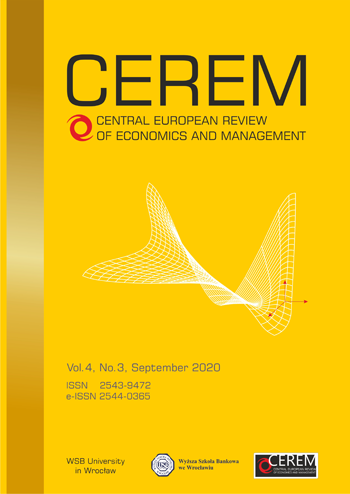Exchange of new ideas: towards a more open, cooperative and sustainable world
DOI:
https://doi.org/10.29015/cerem.891Słowa kluczowe:
new ideas, empowerment, climate change, COVID-19, European Union, decision making process, risk management, sustainable developmentAbstrakt
Aim: Provide a summary of the expressed views, presentations and discussions during the ISINI14 (2020) online conference.
Design: Next to rather traditional but this time online presentations, the discussions not only took place by way of oral communication, but also via an online tool. The administrators of the conference prepared in a word-processing programme a framework, where the participants could enter issues, questions and comments in real time, and react to each others writings. These issues, questions and comments were also discussed orally. The results of the exchange of new ideas are presented below, and should provide an impulse for further discussion at ISINI online meetings in the future.
Findings: In order to achieve sustainable development, protect democratic values and empower citizens in different countries with a different institutional setting, a sound balance between open markets and sound regulation should be struck at various levels. Global and regional (EU) cooperationis needed for solving challenges to sustainable development – e.g. in relation to unexpected events such as the COVID-19 pandemic and climate (change) as a kind of public good.
Keywords: new ideas, empowerment, climate change, COVID-19, European Union, decision making process, risk management, sustainable development
JEL: D70, D81, F02, Q01, Q54
Bibliografia
Acemoglu D., Robinson J.A. (2019),. The narrow corridor: states, societies, and the fate of liberty, Penguin Press, New York.
Alemanno A. (2020), The EU won’t fix its democratic deficit with another top-down ‘conference’, “The Guardian”, https://www.theguardian.com/commentisfree/2020/jan/21/eu-democratic-deficit-top-down-conference-verhofstadt [27.09.2020].
Amyotte P., Margeson A., Chiasson A., Khan F. (2014), There is no such a thing as a Black Swan process incident, Hazards 24 Institution of Chemical Engineers Symposium Series, 7-9 May 2014, Edinburgh, United Kingdom, pp. 12-21. [Non Refereed Conference Paper].
Bell E. (2017), Brexit and the illusion of democracy, “Socialism and Democracy”, vol. 31 no. 3, pp. 52-73. doi: 10.1080/08854300.2017.1368888
Bonde J. (2011), The European Union’s democratic deficit: How to fix it, “The Brown Journal of World Affairs”, vol. 17, no. 2, pp. 147–162
Etzioni A. (2018), Law and society in a populist age – balancing individual rights and the common good, Bristol University Press, Bristol.
Glaubrecht, M. (2019), Das Ende des Evolution – Der Mensch und die Vernichtung der Arten (The end of evolution – Man and the annihilation of species), Bertelsmann Verlag, München.
Hammarskjöld, D. (1954), "Address by secretary-general Dag Hammarskjold at university of California convocation," UN department of public information, New York.
Harari, Y.N. (2020), The world after coronavirus, “Financial Times”, 20 March. https://www.ft.com/content/19d90308-6858-11ea-a3c9-1fe6fedcca75.
Mavrozacharakis E., Tzagkarakis S.I., Kamekis A. (2017), Brexit: a consequence of the European social and democratic deficit (working paper), http://nbn-resolving.de/urn:nbn:de:0168-ssoar-51586-8, doi: 10.13140/RG.2.2.24452.12169.
Sorace M. (2018), The European Union democratic deficit: Substantive representation in the European Parliament at the input stage, “European Union Politics”, vol. 19 no. 1, pp. 3-24. doi: 10.1177/1465116517741562.
Taleb N.N. (2012), Antifragile - things that gain from disorder, Penguin Books, London.
Sotiris S. (2017), Democracy and democratic deficit in the European Union, “The New Federalist”, https://www.thenewfederalist.eu/democracy-and-democratic-deficit-in-the-european-union?lang=fr [27.09.2020].
Will M. (2020), The CoViD-19 pandemic and the end of corporate risk management as we know it, “Central European Review of Economics and Management”, vol. 4 no. 3, pp. 89-115.
Pobrania
Opublikowane
Numer
Dział
Licencja
Autor przenosi nieodpłatnie na Wyższą Szkołę Bankową we Wrocławiu , bez ograniczeń terytorialnych, majątkowe prawa autorskie do tego utworu w rozumieniu ustawy z dnia 4 lutego 1994 roku o prawie autorskim i prawach pokrewnych ( Dz.U. 1994, Nr 24, poz. 83 ze zm. )na zasadzie wyłączności, tj. prawo do:
a) wyłącznego używania i wykorzystania utworu w dowolnej działalności przez Wyższą Szkołę Bankową we Wrocławiu, w szczególności w działalność Biblioteki Cyfrowej uruchomionej przez Wyższą Szkołę Bankową we Wrocławiu
b) wytwarzania, utrwalania i zwielokrotniania egzemplarzy utworów wszelkimi technikami, w tym techniką drukarską, reprograficzną, zapisu magnetycznego oraz techniką cyfrową, w szczególności ich zwielokrotniania poprzez dokonywanie zapisów na płytach typu CD,
c) zamieszczenia wybranych fragmentów utworu w celach promocyjnych w publikacjach, materiałach promocyjnych, w sieci Internet oraz sieciach wewnętrznych typu Intranet Wyższej Szkoły Bankowej we Wrocławiu,
d) wprowadzania utworu do pamięci komputera Wyższej Szkoły Bankowej we Wrocławiu,
e) kopiowania i powielania utworu w technologiach fotomechanicznych lub innych znanych w dniu zawarcia umowy (fotokopie, kserokopie itp.),
f) przetworzenia dzieła na formę elektroniczną i nieograniczonego rozpowszechniania w sieci Internet.


